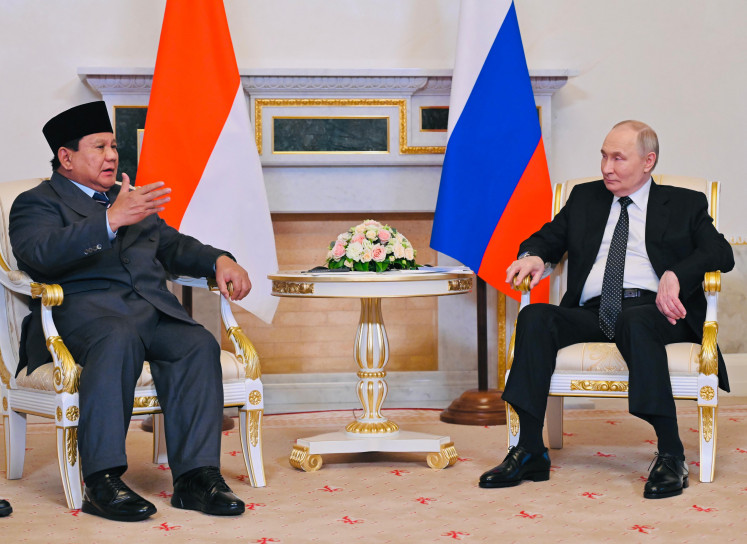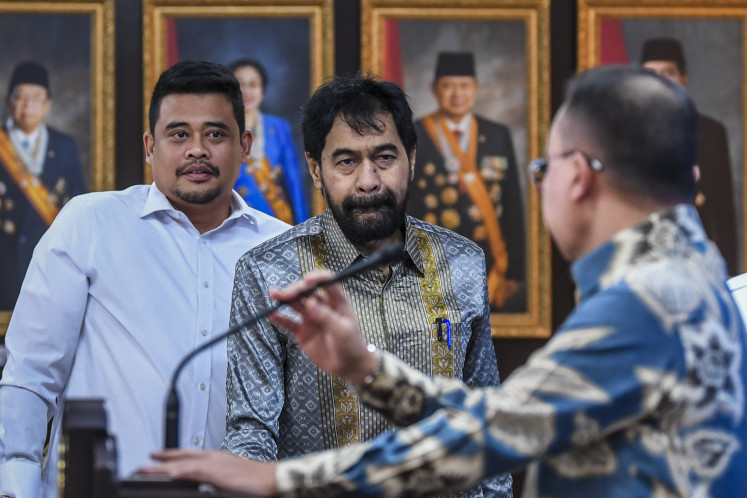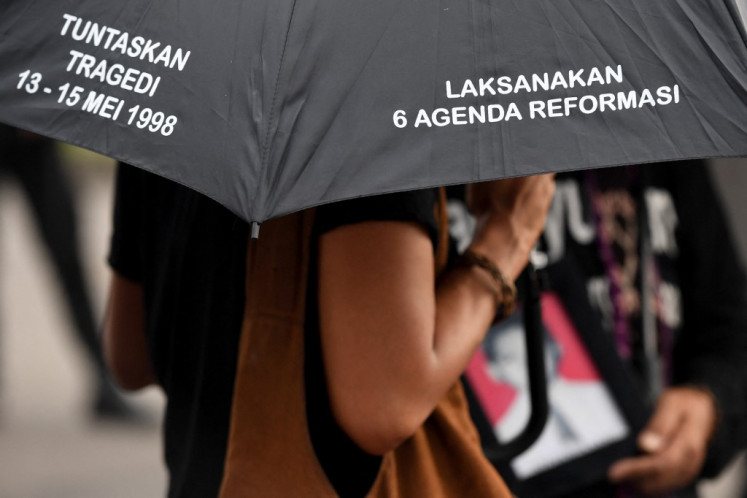Popular Reads
Top Results
Can't find what you're looking for?
View all search resultsPopular Reads
Top Results
Can't find what you're looking for?
View all search resultsMinistry pins hopes on N. Sumatra for coffee export
The Agriculture Ministry is pinning its hopes on North Sumatra for a rebound in Indonesia’s Arabica coffee bean exports after the province shipped Rp 72
Change text size
Gift Premium Articles
to Anyone

T
he Agriculture Ministry is pinning its hopes on North Sumatra for a rebound in Indonesia’s Arabica coffee bean exports after the province shipped Rp 72.9 billion (US$5.15 million) worth of the commodity recently.
North Sumatra, known for its Mandailing, Lintong and Sidikalang coffee varieties, exported 819 tons of beans to the United States, Germany, the United Kingdom, Romania, Japan, Canada, Belgium, Mexico, Taiwan, China, Australia and Singapore last week.
The ministry’s Agriculture Quarantine Agency head Ali Jamil said that so far, a total of 40 countries had imported the commodity from North Sumatra.
He said he expected North Sumatra to increase its coffee bean exports this year amid Indonesia’s declining exports of the commodity in the last three years.
“We hope the country’s coffee bean exports will see some improvement this year, especially from North Sumatra, which has a lot of potential,” Ali said at the recent export ceremony in Deli Serdang, North Sumatra.
Indonesia has seen fluctuating coffee exports since 2010 according to data from Statistics Indonesia (BPS). The largest export was in 2013 with 534,000 tons of beans, valued at $1.174 million. In 2017, Indonesia exported 467,800 tons of beans worth $1.187 million, according to BPS.
However, he ensured that export destination countries would not repudiate Indonesia’s coffee beans as they were in accordance with the Agreement on the Application of Sanitary and Phytosanitary Measures, and were therefore free of quarantined plant pests and were phytosanitary-certified.
He added that North Sumatra’s coffee bean exports had quite a significant role in contributing to the country’s foreign exchange earnings. The exported commodity mainly came from Sidikalang, Sipirok, Mandailing, Tarutung and Lintong, he said.
“North Sumatra is Indonesia’s fourth-biggest coffee bean producer after South Sumatra, Lampung and Aceh,” Ali said.
North Sumatra deputy governor Musa Rajeckshah said the province had been the country’s major producer of Arabica coffee with 89,142 hectares of plantations and 66,639 tons of production.
“There are six main producers of Arabica coffee in North Sumatra: Lintong, Mandailing, Simalungun, Sipirok, Samosir and Karo,” he said.
Musai expressed his appreciation toward farmers’ productivity, which had allowed the region to hold its second export activity in the first quarter of this year after it exported 50.2 tons of cabbage in February.
Despite the continuous decline in the country’s coffee bean exports, North Sumatra saw a 7.3 percent year-on-year (yoy) growth in its agricultural commodity exports to $702 million in 2018 from $654 million in 2017 according to BPS.
Indonesia produced 653,000 tons of coffee in 2017, according to Indonesian Plantation Statistics. South Sumatra held the largest proportion of coffee exports with 22 percent, followed by Lampung with 21 percent. North Sumatra accounted for 8 percent of the total exports, the data showed.
South Sumatra is also set to increase its coffee exports. Producing robusta beans, the province wants to make its name known in the international coffee market.
International trade director of PT Perusahaan Perdagangan Indonesia (PPI) Persero, Ahmad Yaniarsyah, said his company had focused more on exporting coffee from Java such as from Ciwidey and Garut in West Java. But after touring six coffee production centers in South Sumatra, PPI wanted to develop coffee exports from South Sumatra as well.
However, South Sumatra needed some improvements in its coffee industry to achieve a premium quality of export standard, Yaniarsyah said during Musi Coffee Culture festival at PPI’s old building, Jacobson van den Berg in Palembang, on April 5.
Improvements were needed, for example, in the planting system at the farmer level, harvest, post-harvest technology, as well as branding for particular produce such as Pagaralam or Semendo coffee to be introduced to the international market under a marketable brand.
South Sumatra’s Pagaralam and Semendo coffee is to be introduced through the World Barista Championship & World Brewers Cup in Boston on April 14, according to Indonesian Special Coffee Association chairman
Syafruddin.
“We will make South Sumatra coffee well known,” he said. (ars)
— Yulia Savitri also contributed to this report from Palembang, South Sumatra








